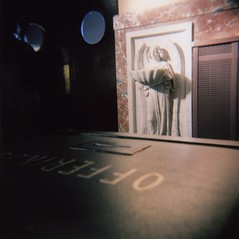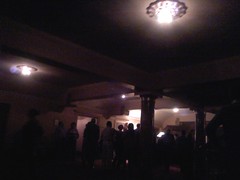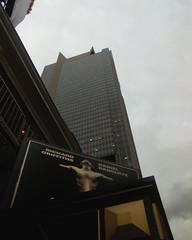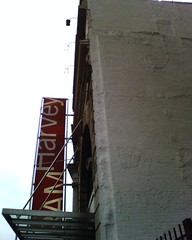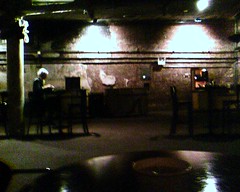
One of the central purposes of the exhibition is not only to explore the way maps summon national identities but, conversely, to investigate the way they function to force other identities out of locations.
Curator Rhoda Rosen writing in the catalog of the exhibit Imaginary Coordinates showing now at the Spertus Museum through September 7, 2008.
The
Spertus Museum wasn’t on the docket for Sunday. The plan was to hit the matinee showing of
The Thomashefskys: Music and Memories of a life in Yiddish Theater at the CSO, a show that held a lot of promise if you don’t mind (and lord knows I don’t mind) running in circles that trend twenty to thirty years my senior and concern themselves with things like the Yiddish Theater in America that took root in New York’s Lower East side the
last time we got all worked up over the unstoppable tide of immigrants landing on American shores.
That time it was the Irish and the Ukrainians and the Poles and the Russians who were Gilding our Age -- and a fraction of those pouring in from Eastern Europe were Jewish. The story told at the Symphony, as it was patched together by
Michael Tilson Thomas, the music director of the San Francisco Symphony, concerned two of those immigrants who also happened to be Thomas’ grandparents
and two of the leading lights of that Yiddish Theater:
Boris and
Bessie Thomashevsky.
It was unexpected that we’d have a couple hours to kill before the show, and the Spertus had been on the list of things to see ever since Blair Kamin mentioned its
remarkable architecture in the Trib and we stopped by briefly with half an hour to spare sometime back to see what was doing only to discover that they wanted a good chunk of change to get to the ninth and tenth floors where the exhibition and the collections are.
Time being short we took a pass then, poking around the library instead and digging the amazing video work at the top of the stairs by the cafe (that g*d*it I didn’t take notes on), but on Sunday we circled back with our hour and half, which by the time the guide [1] was ready for us had diminished to 45 minutes. We were the only ones under her charge so she was kind enough to trim it back and gave us the floor show in the time allowed.
What we saw was this: An exhibit which I incorrectly called Imaginary Boundaries in an
earlier post -- it’s actually called
Imaginary Coordinates -- about mapping the thing that you might expect a Jewish American Museum to put on a show about: The Holy Land.
In a way that you might not expect from a Jewish American Museum: From an attempted non-partisan point of view.
“Attempted” because of course the place itself imposes a point of view, and you could feel the tension in the room. There was a fair amount of heat generated by the couple who we picked up in the elevator, who rode up with us, asked a few barbed questions about
what was going on here and then politely excused themselves from our guide’s good graces.
We saw them later taking their seats at the Thomashefsky show. Maybe they were just in a hurry. Maybe they weren’t put off by the fact that artifacts from both sides of the conversation shared equal space; by the fact that a map rendered from the memory and by the hand of a Palestinian man in exile to describe his home village which no longer exists, was provided equal real estate alongside the hand-drawn storyboard that a father bound for Auschwitz (who would never return) drew for the four-month old son whom he tucked away in hiding, the storyboard outlining the life that he hoped for him -- his safe survival, his potty training, education, marriage, and finally, “next year in Jerusalem!” (The storyboard compelled the small boy, grown to man, to move to and settle in Israel.)
Maybe they weren’t put off by any of that -- but they sure were cranky.
Although Imaginary Coordinates is part of the citywide
Map Festivus that’s been running for a little while now, the maps themselves -- among them elaborate Dutch maps from the 15th century, British renderings from World War II, a map of the Geneva Initiative from 2003 -- all of them the works by men, are offset in the exhibit by contemporary artworks, all of them the creation of women who have some connection to that same hotly contested piece of land.
Remarkable among them was Shirley Shore’s 2004
Landslide composed of a sandbox arranged to resemble a desert topography over which is projected in real time:
a square grid of blinking color cells generated by a code. Beginning each sequence with a palette of sixteen colors and thousands of color cells, the map gradually transforms as cells appropriate neighboring areas. When two colors ultimately dominate the grid, the program stops and begins anew. Landslide operates on an infinite loop in which each cycle produces a different map and a different visual experience. [2]
I asked the guide what the algorithm was that drove the colors in their consumption of one another -- she was unsure but speculated that it was the larger color blocks that swallowed the smaller ones with which they collided. The impact was remarkable: a strange camouflage that morphed into a topographical map and then began again.
As you might expect it was impossible to experience an exhibit like that, marking as it does the 60th anniversary of the modern state of Israel, without the hovering awareness of who is conquerer and who is conquered in this equation -- even with the careful attention that was given to both sides of the narrative.
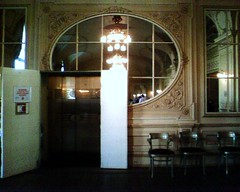
The contrast then, with the Thomashevsky show, was to be reminded of the diaspora, the thing that came before all this by just a few brief years; Jews without a home struggling to make America theirs.
The Thomashevskys were remarkable showmen but they were social activists too, providing theater for the Jewish community (in the Yiddish language, which felt like home) about the trials that they faced in this new place. One of their most popular running conceits was of the “green” immigrant and his and her comedic struggles and ultimate triumphs in their new world.
When their drama-ridden personal lives resulted in a split (but never divorce) Bessie Thomashevsky created a new theater and went to town with treatments of women’s issues like suffrage and birth control that sold out houses -- the Jewish Suffragette was one of her most popular roles.
The show was light spirited and entirely enjoyable (although maybe a little too precious, given that it was a treasure served up by a loving grandson who held his subjects a little too close), but the contrast that it presented to the Spertus exhibit was remarkable. In the CSO show the theme of liberation was unmistakable: It vouched for the freedom to live a creative life and to fiercely claim human rights for oneself and one’s community. One of the more memorable themes that defined one of the Thomashevsky’s biggest blockbuster was
Das Pintele Yud (sounds like: "das pintela yee"), which spoke to something ineffable and untranslatable from Yiddish -- a grammatical mark that symbolizes (what the song board attempted to translate as) the “spark of Jewishness”. Working, striving, inexhaustible. Rich, spirited, alive.
Brilliantly uplifting in the context of the immigrants’ underdog story on foreign shores. Wholly unsettling (confronted hard on the heels of the quick sprint we made down Michigan Avenue to bridge the distance between the Spertus and the Symphony Hall) when the underdog has become ubermensch, and a chord change has been sounded.
[1] The Chicago Tribune reported in May that Imaginary Coordinates “closed earlier this month for organizers to re-evaluate content, [and] reopened with the major change being that
visitors now must see it on guided tours beginning at the head of every hour. Nearly everything else is unchanged, meaning the show is still the most surprising of the eight with art in Chicago's Festival of Maps as well as a rewardingly unconventional commemoration of the 60th anniversary of Israel's founding.”
Coordinates' Rewardingly Unorthodox by Alan G. Artner (May 22, 2008) [2]
Imaginary Coordinates (Spertus Press Chicago)

